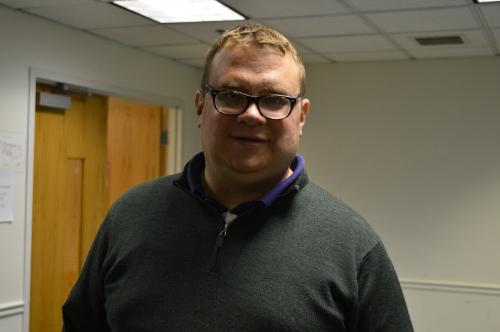Adjuncts Petition for Paid Office Hours

Rich Otten is one of the adjunct professors looking to get paid office hours.
November 25, 2014
Adjunct faculty members of Anne Arundel Community College are becoming vocal about the lack of payment for their office hours.
Over half of the classes at AACC are taught by adjunct faculty members, and as a result, many students will find that they have an adjunct professor teaching their class.
Richard Otten, an adjunct professor of English, American studies, and gender and sexuality studies at AACC, is one of them.
“I always find it a bit humiliating when I pass out a syllabus at the beginning of a semester,” said Otten.
When students look at Otten’s syllabus, they quickly realize that no office hours are listed, he said.
The lack of office hours is one of the main concerns of the adjunct faculty members, said Otten. One of their goals is to “have some accommodation for office hours,” he said. This includes being given a place to meet with students, he added.
This issue is not only a problem for the adjunct faculty, but also for their students, said Timothy May, an adjunct English professor at AACC.
“Not offering compensation for office hours devalues that relationship between professor and student, and places students who have an adjunct professor at an immediate disadvantage,” said May.
Members of the adjunct faculty are organizing a petition to help resolve this issue. “The petition simply asks the administration to offer adjuncts an optional paid office hour per course taught,” said May.
While members of the adjunct faculty have been vocal about this issue, the faculty is constantly working to help them, said Ken Jarvis, president of The Faculty Organization and associate professor in the Hospitality, Culinary Arts and Tourism Institute at AACC.
“We are always looking out for and advocating on behalf of adjuncts,” said Jarvis. TFO has been pushing for an adjunct resource center, Jarvis said. This resource center would be a place for the adjunct faculty to come and meet with their students, he
confirmed.
However, members of the adjunct faculty believe that they are being mistreated.
“This is a very real, very local, social justice issue,” said Otten.
Although the adjunct faculty members do not know how this will end, they do not have any plans to strike, said May. Yet May maintains that there must be a change.
“At some point if you’re not standing up to a system that’s harming students and faculty alike then you’re complicit with it,” said May.
While adjunct faculty members are concerned about being paid and office hours, they want to make sure that if these changes are made, they will improve the whole school.
“We would like to make the jobs better, and in so doing, make the college better,” said Otten.
It is not clear how or when these concerns will be addressed. However, The Faculty Organization is working to meet the needs of the adjunct faculty, said Jarvis. “There are things being done through our meetings and through our administration to make things better for our adjuncts,” Jarvis said.
The Adjunct Faculty Affairs Committee is also working to help both the adjuncts
and their students.
The committee “currently is working very hard in researching options for an adjunct faculty certification program that will benefit adjuncts in their teaching and consequently the students receiving the instruction,” said James Messenger, assistant professor of mathematics and chair of the Adjunct Faculty Affairs Committee.











